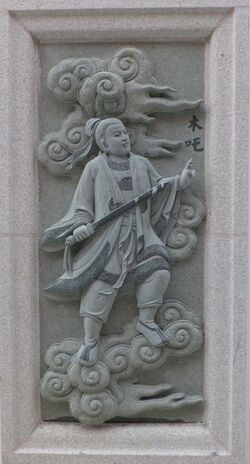Religion:Muzha (deity)
Muzha (Chinese: 木吒; pinyin: Mùzha) is a figure in Chinese mythology and a god in Chinese traditional religion.
Muzha appears in some works including Fengshen Yanyi and Journey to the West. According to folklore, Muzha was born a human during the end of the Shang dynasty to General Li Jing. He is a disciple of the Bodhisattvas Samantabhadra and Guanyin. He had two brothers, Nezha and Jinzha.
Appearance in Fengshen Yanyi
In the classic Chinese novel Fengshen Yanyi, Muzha is the second son of Li Jing and Lady Yin. In appearance, Muzha is seen wearing a small top knot, a silk sash, linen shoes, and a cotton like garment. Thus, Muzha was seen as a celestial being — such as that of a superiorman — in appearance.
For many years, Muzha had left his father, Li Jing, to study under Superiorman Universal Converter of White Egret Cave. Following the rebirth of Nezha, and the near death of Li Jing, Li Jing would run into Muzha — as to save his life. Muzha would react with great anger towards Nezha and would soon battle it out with his renowned long sword against the fire-tipped spear. Soon enough during their fierce duel, Li Jing would try to make another escape; this was the point in which Muzha would be defeated by Nezha's golden brick — which thrust him to the ground due to its great weight. Following this point, Muzha would later present himself before Li Resounding, one of four superiormen of Nine Dragon Island. Muzha chose to immediately kill Li Resounding at the first sign of defiance towards his words. Muzha would remain as a celestial protector of the Western Foothills with Nezha and Jinzha following this point.
Journey to the West
In Journey to the West, Muzha became a disciple of Guanyin in the heavenly court, with the legal name Hui An. When he was ordered to conquer sand demon, and later Sun Wukong lost to the Red Boy, Hui An borrowed 36 Tian Gang swords from his father Li Jing to help the Guanyin Bodhisattva conquer the Red Boy, making him a good boy under the Guanyin.
References
- Investiture of the Gods Chapter 14 pages 166 - 167[better source needed]


